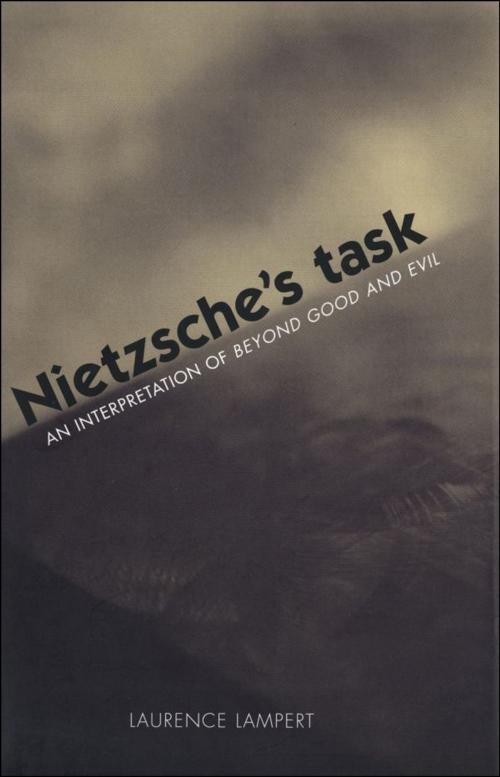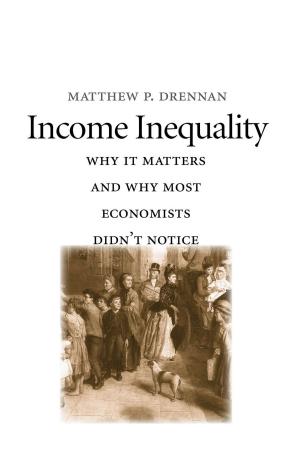Nietzsche's Task
An Interpretation of Beyond Good and Evil
Nonfiction, Religion & Spirituality, Philosophy| Author: | Professor Laurence Lampert | ISBN: | 9780300128833 |
| Publisher: | Yale University Press | Publication: | October 1, 2008 |
| Imprint: | Yale University Press | Language: | English |
| Author: | Professor Laurence Lampert |
| ISBN: | 9780300128833 |
| Publisher: | Yale University Press |
| Publication: | October 1, 2008 |
| Imprint: | Yale University Press |
| Language: | English |
When Nietzsche published Beyond Good and Evil in 1886, he told a friend that it was a book that would not be read properly until around the year 2000.” Now Laurence Lampert sets out to fulfill this prophecy by providing a section by section interpretation of this philosophical masterpiece that emphasizes its unity and depth as a comprehensive new teaching on nature and humanity.
According to Lampert, Nietzsche begins with a critique of philosophy that is ultimately affirmative, because it shows how philosophy can arrive at a defensible ontological account of the way of all beings. Nietzsche next argues that a new post-Christian religion can arise out of the affirmation of the world disclosed to philosophy. Then, turning to the implications of the new ontology for morality and politics, Nietzsche argues that these can be reconstituted on the fundamental insights of the new philosophy. Nietzsche’s comprehensive depiction of this anti-Platonic philosophy ends with a chapter on nobility, in which he contends that what can now be publicly celebrated as noble in our species are its highest achievements of mind and spirit.
According to Lampert, Nietzsche begins with a critique of philosophy that is ultimately affirmative, because it shows how philosophy can arrive at a defensible ontological account of the way of all beings. Nietzsche next argues that a new post-Christian religion can arise out of the affirmation of the world disclosed to philosophy. Then, turning to the implications of the new ontology for morality and politics, Nietzsche argues that these can be reconstituted on the fundamental insights of the new philosophy. Nietzsche’s comprehensive depiction of this anti-Platonic philosophy ends with a chapter on nobility, in which he contends that what can now be publicly celebrated as noble in our species are its highest achievements of mind and spirit.
When Nietzsche published Beyond Good and Evil in 1886, he told a friend that it was a book that would not be read properly until around the year 2000.” Now Laurence Lampert sets out to fulfill this prophecy by providing a section by section interpretation of this philosophical masterpiece that emphasizes its unity and depth as a comprehensive new teaching on nature and humanity.
According to Lampert, Nietzsche begins with a critique of philosophy that is ultimately affirmative, because it shows how philosophy can arrive at a defensible ontological account of the way of all beings. Nietzsche next argues that a new post-Christian religion can arise out of the affirmation of the world disclosed to philosophy. Then, turning to the implications of the new ontology for morality and politics, Nietzsche argues that these can be reconstituted on the fundamental insights of the new philosophy. Nietzsche’s comprehensive depiction of this anti-Platonic philosophy ends with a chapter on nobility, in which he contends that what can now be publicly celebrated as noble in our species are its highest achievements of mind and spirit.
According to Lampert, Nietzsche begins with a critique of philosophy that is ultimately affirmative, because it shows how philosophy can arrive at a defensible ontological account of the way of all beings. Nietzsche next argues that a new post-Christian religion can arise out of the affirmation of the world disclosed to philosophy. Then, turning to the implications of the new ontology for morality and politics, Nietzsche argues that these can be reconstituted on the fundamental insights of the new philosophy. Nietzsche’s comprehensive depiction of this anti-Platonic philosophy ends with a chapter on nobility, in which he contends that what can now be publicly celebrated as noble in our species are its highest achievements of mind and spirit.















